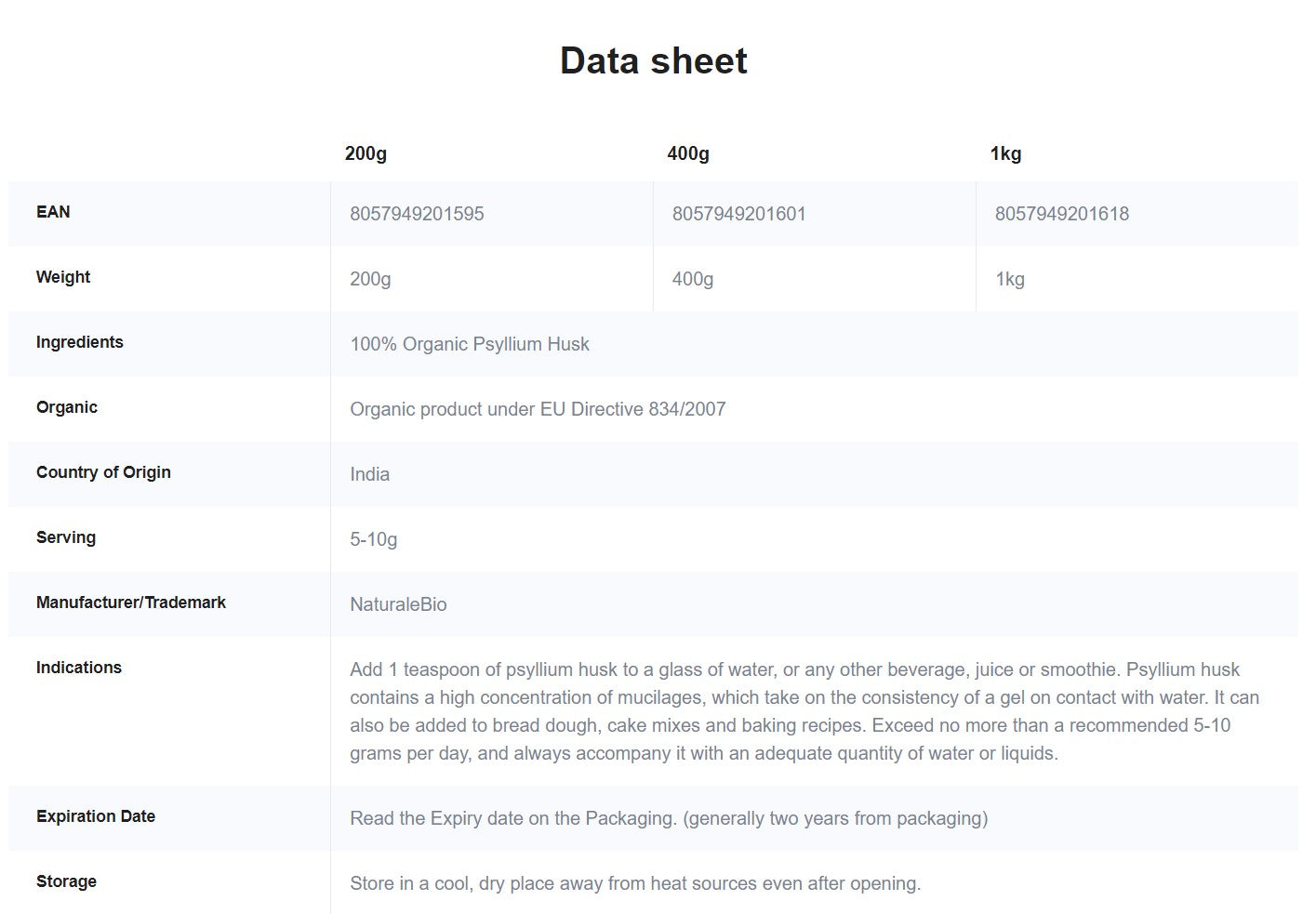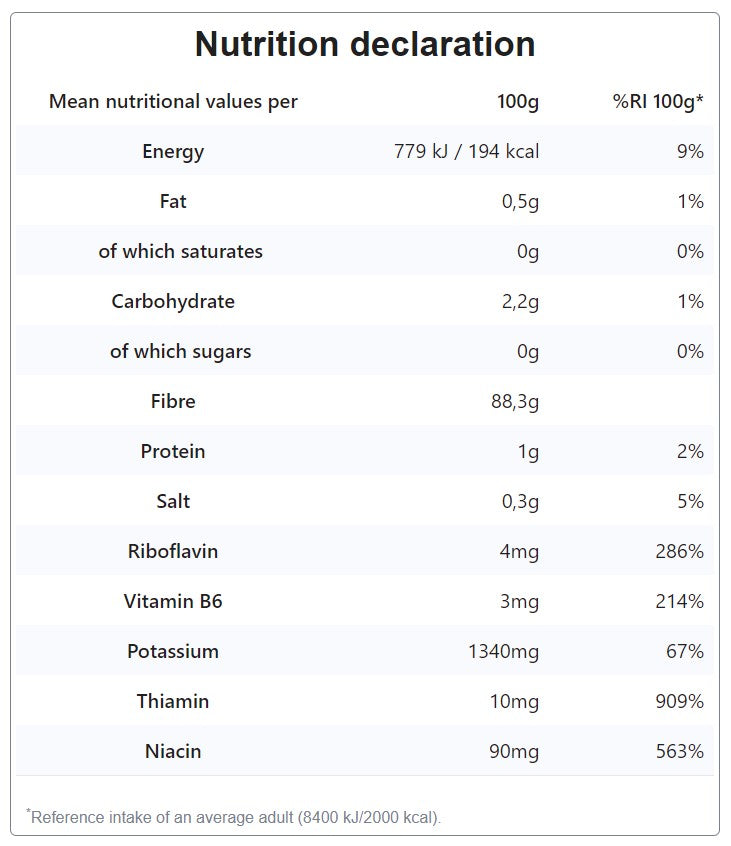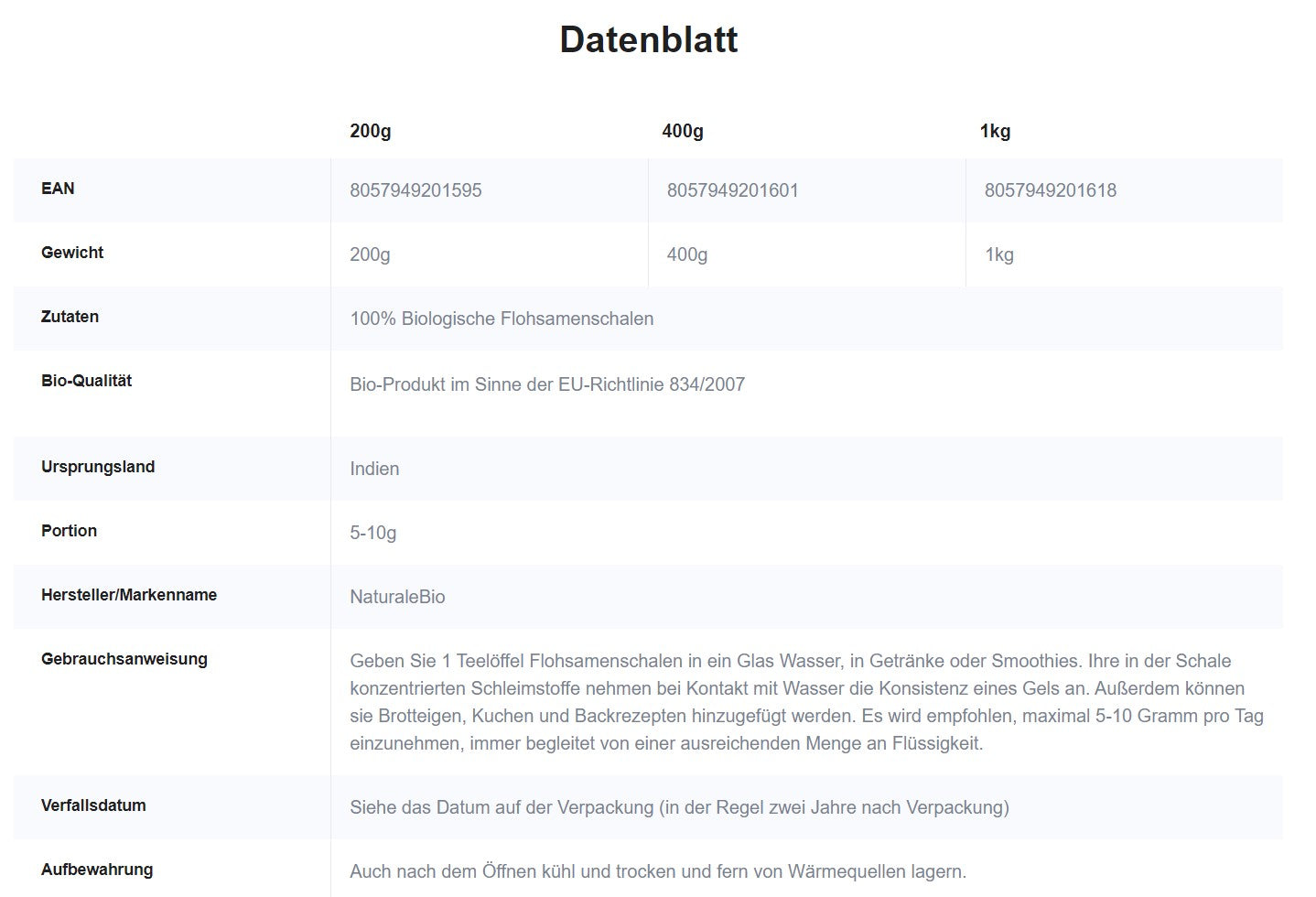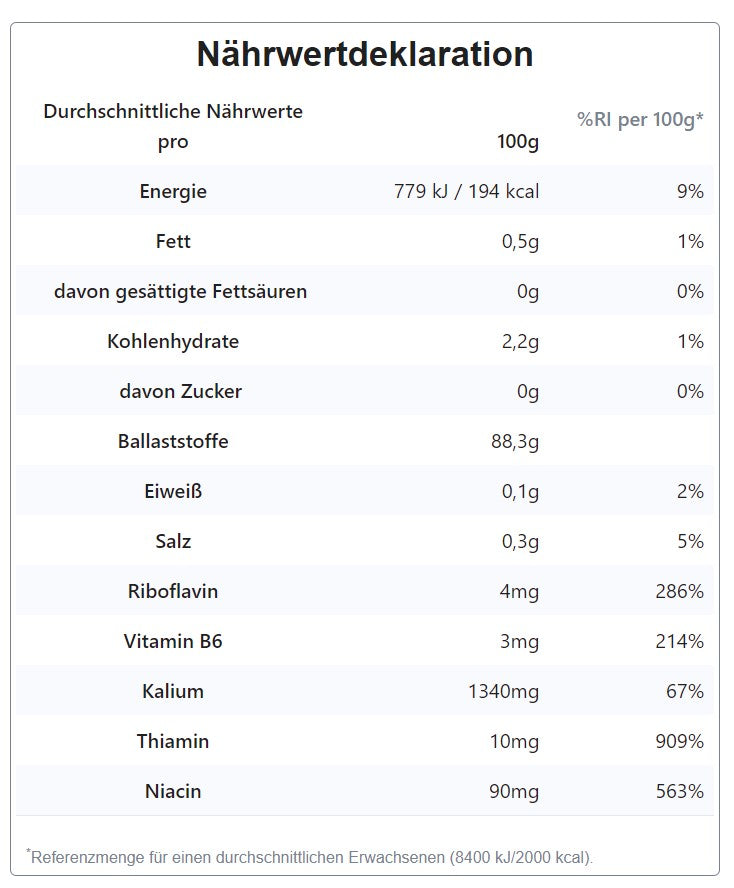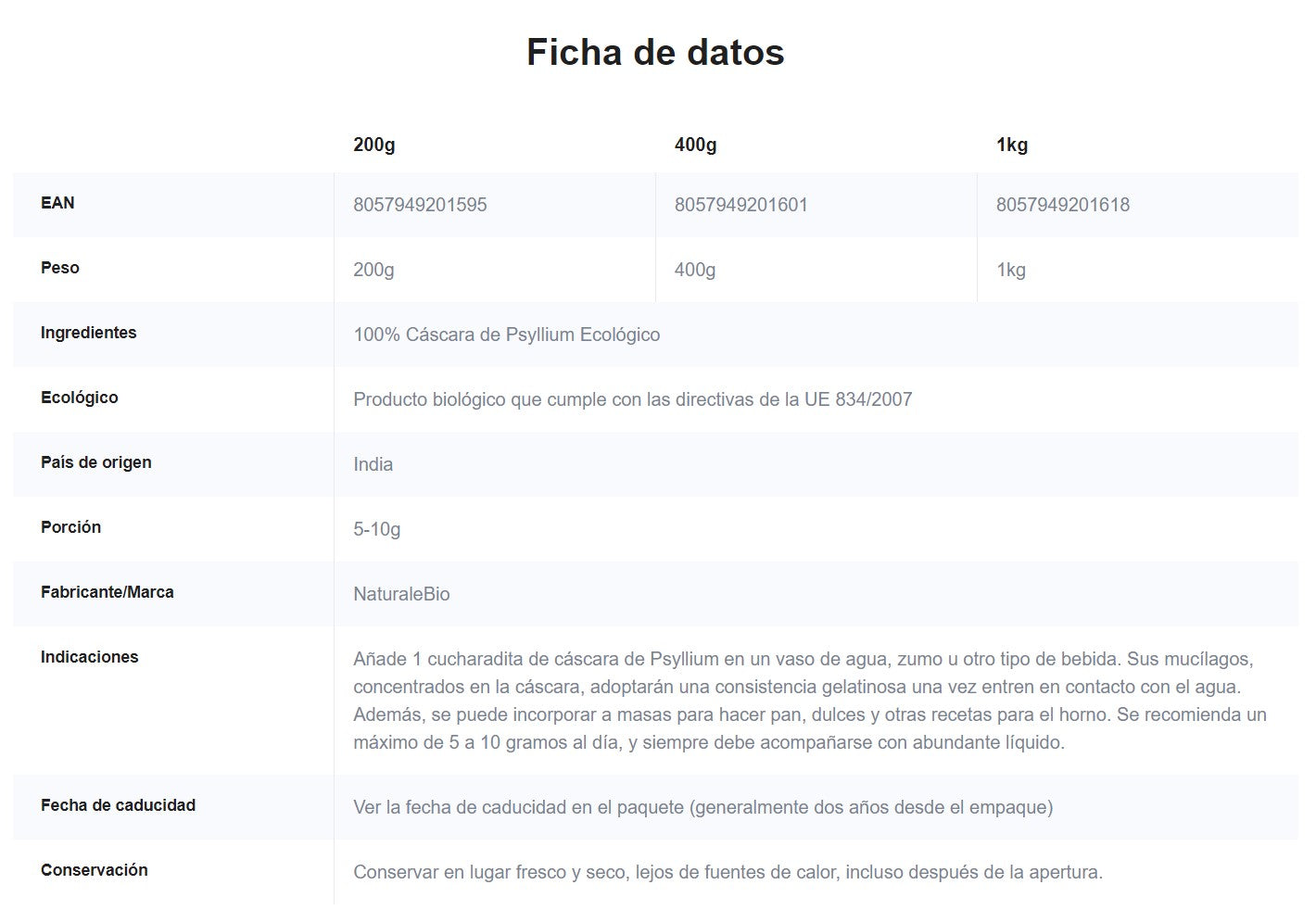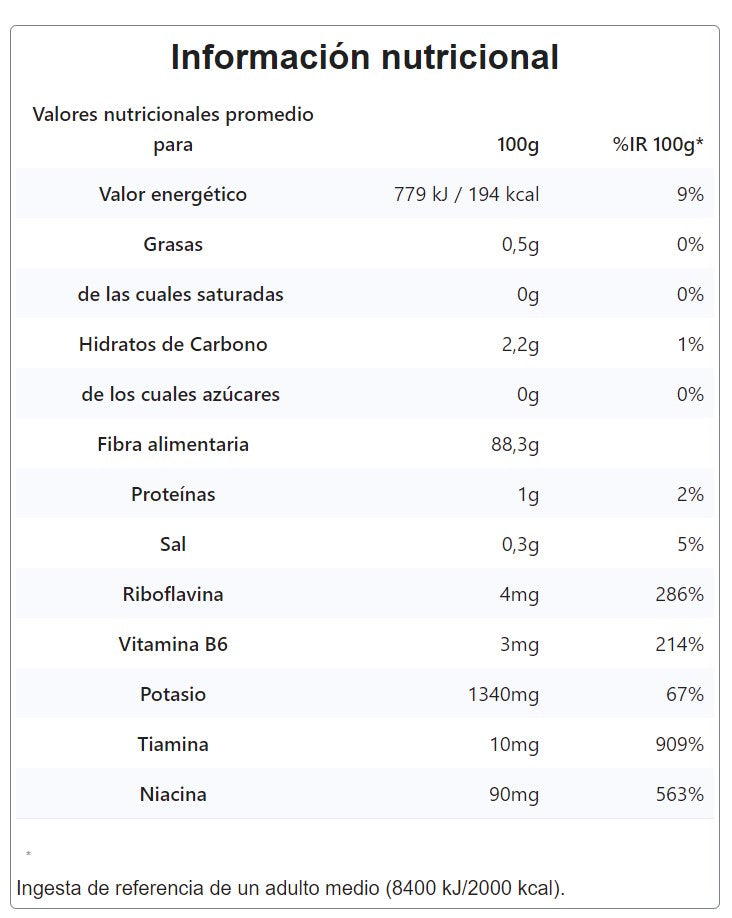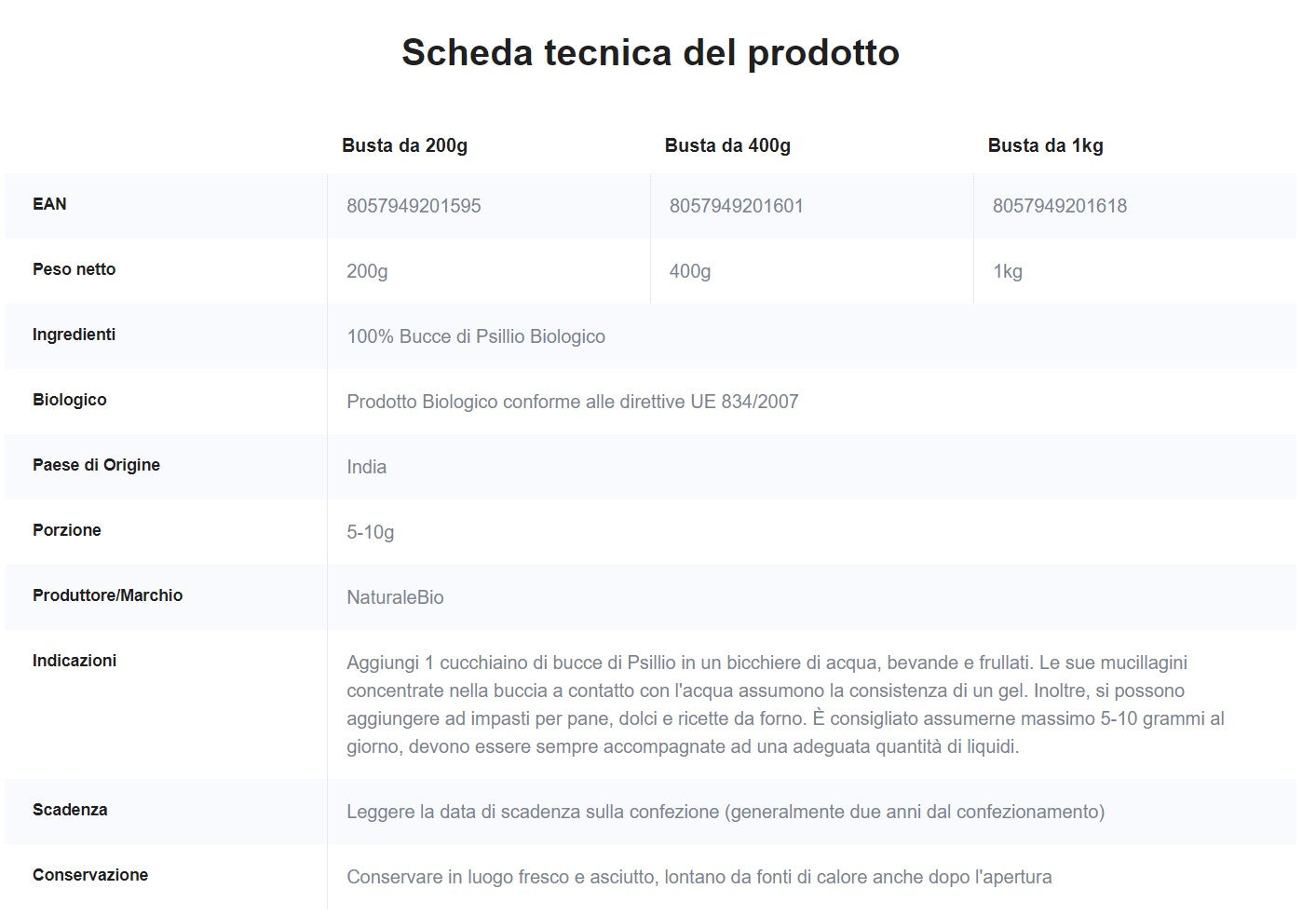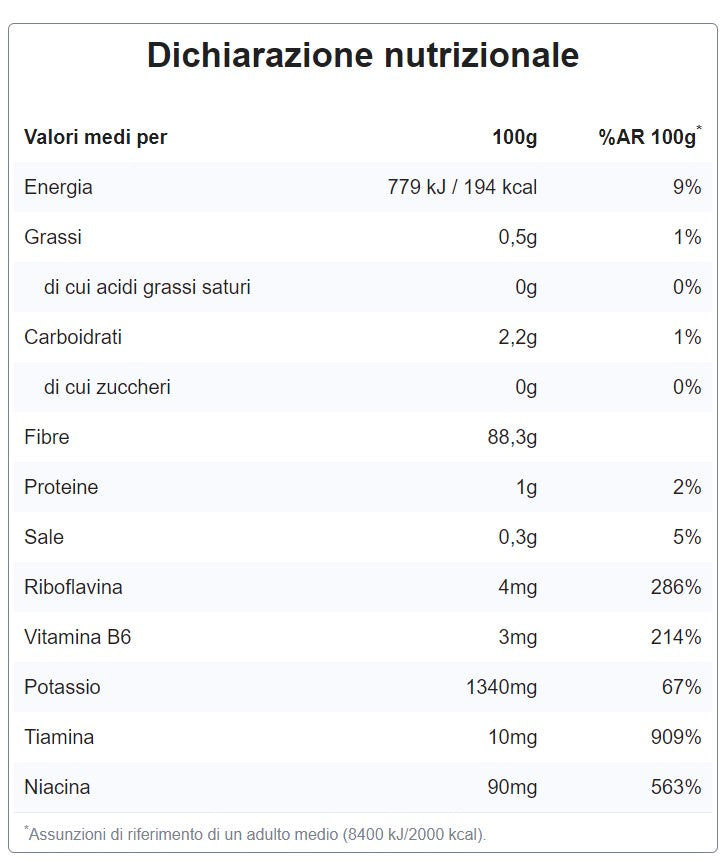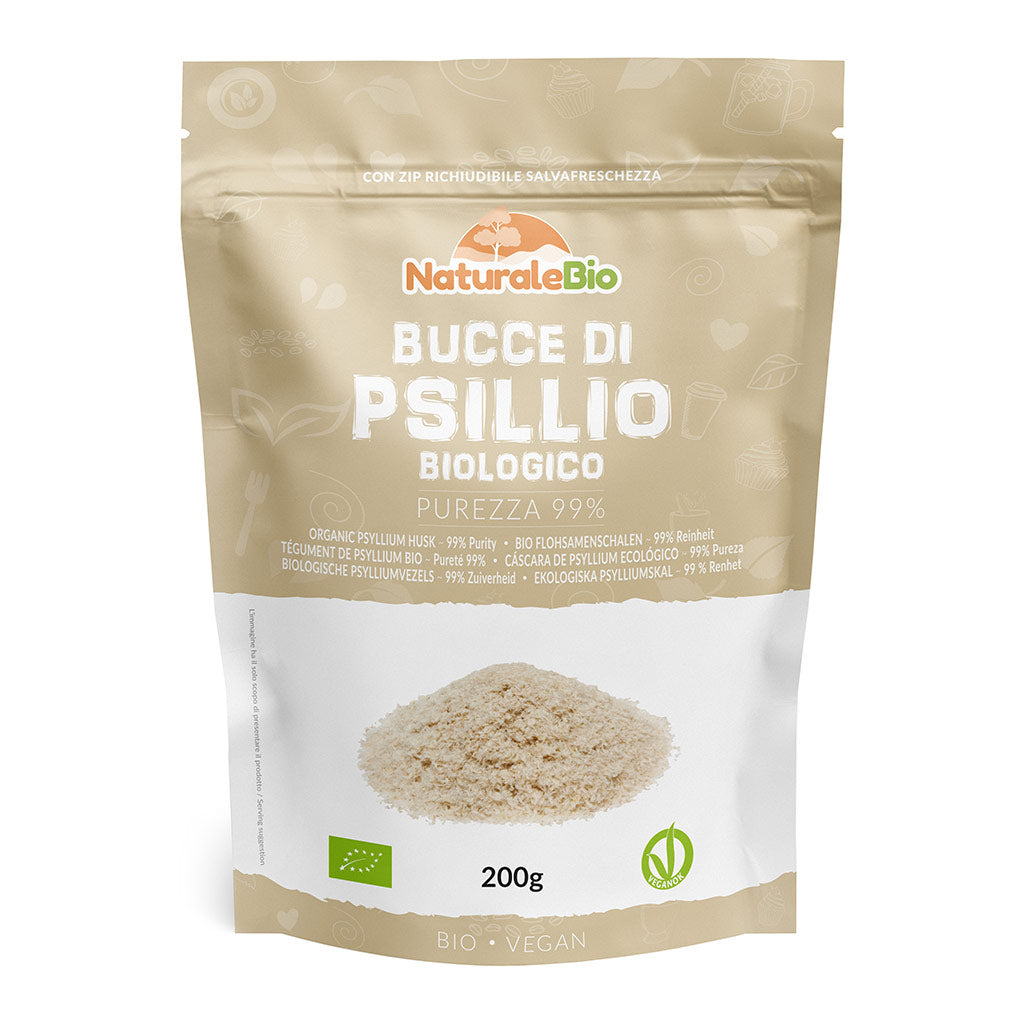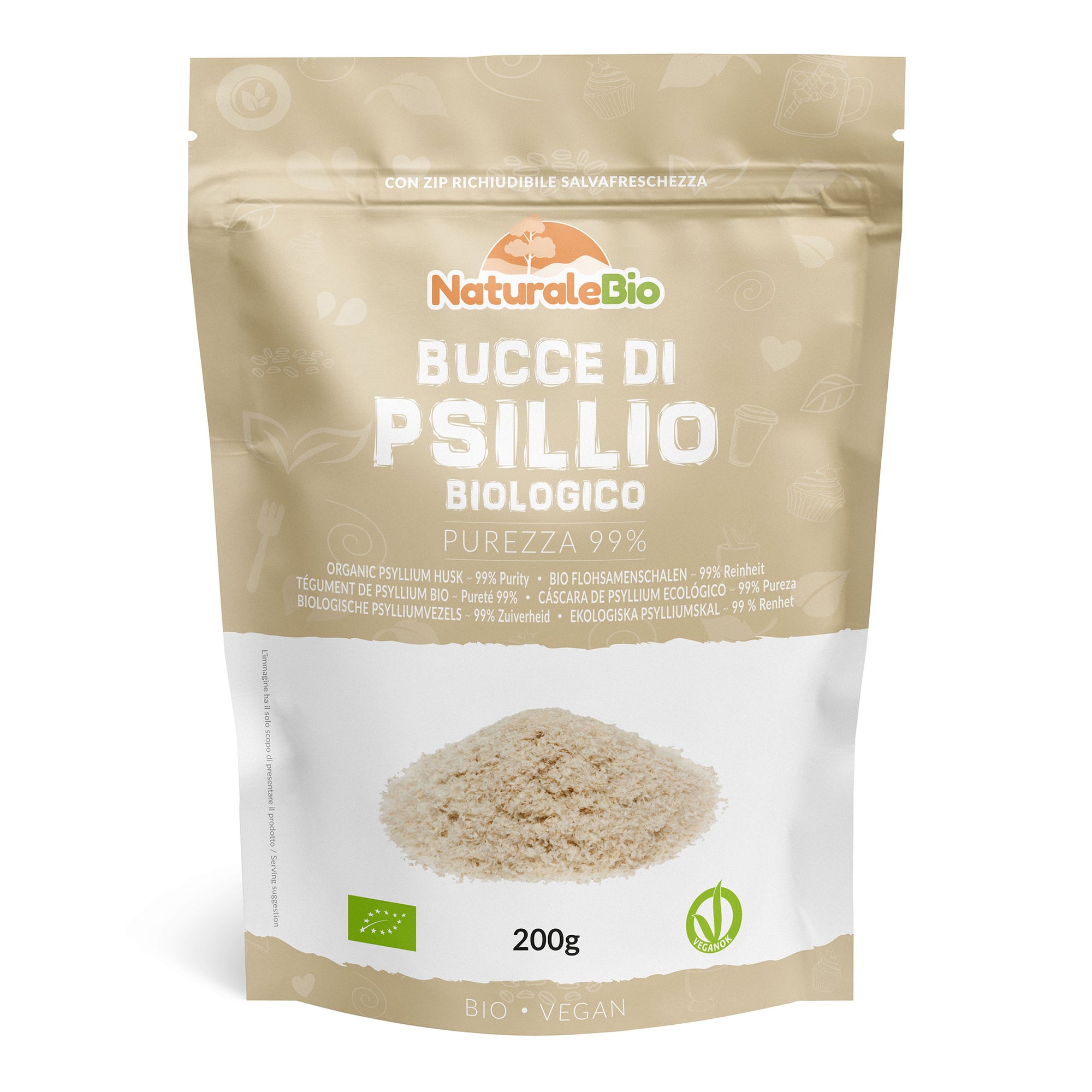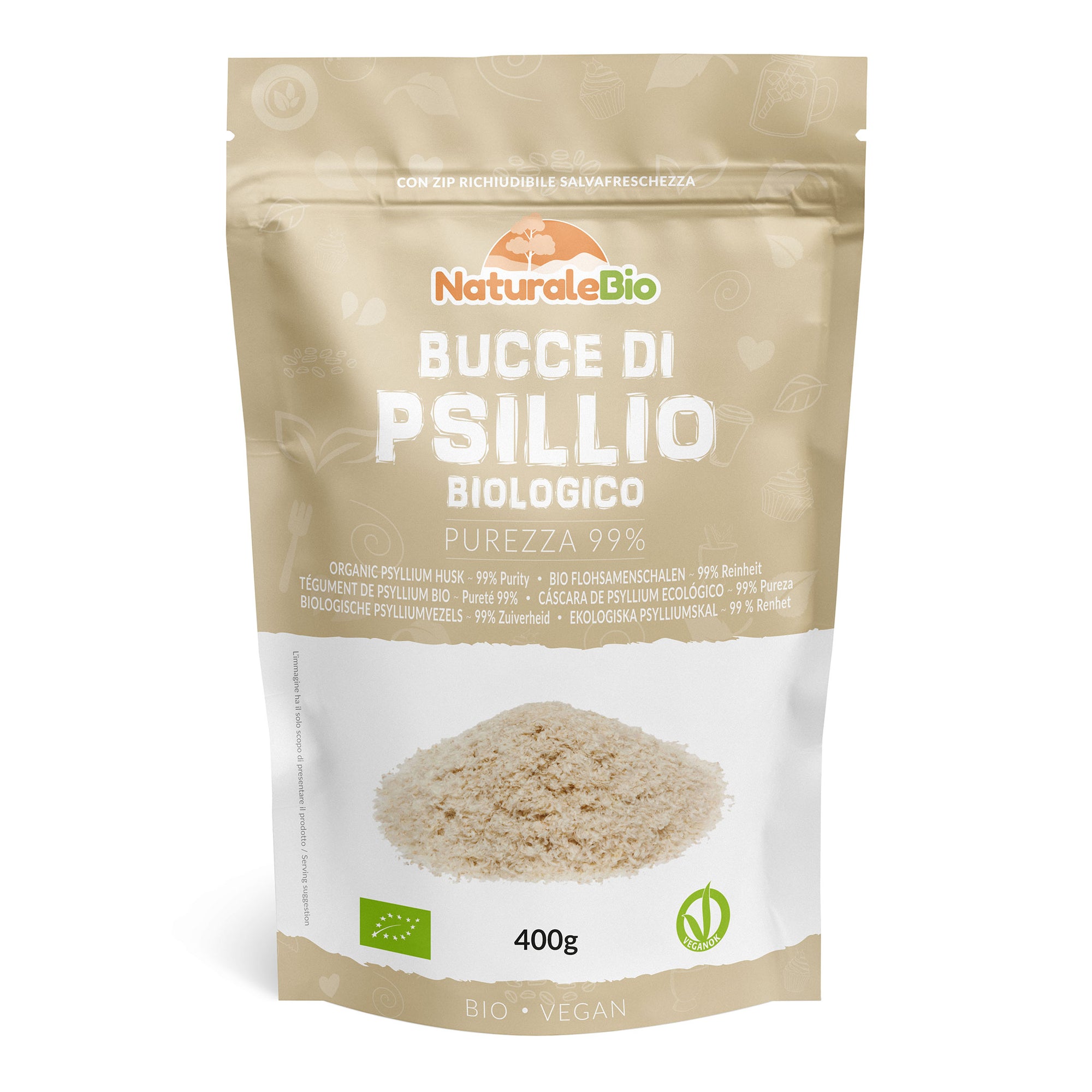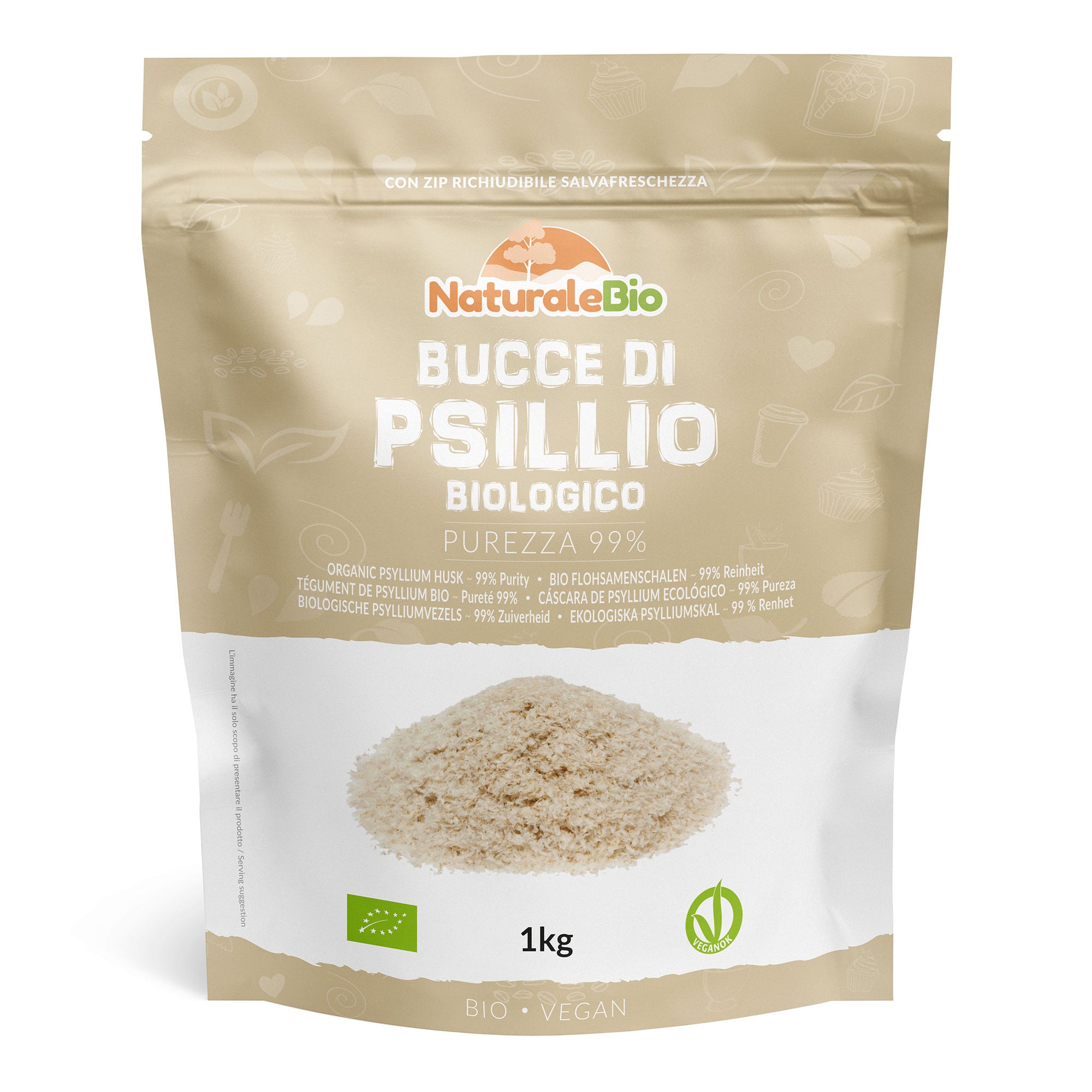- Regular price
- £8.46 GBP
- Unit price
- per
Organic Psyllium Husks (99% purity). Organic, Natural and Pure Psyllium Husk. 100% Psyllium Seed Cuticle, made in India. Rich in Fiber, to be taken in Water, Beverages or Juices.
Couldn't load pickup availability.
Characteristics
-
Made in India
Psyllium is a plant that is increasingly used for its properties. The term “Psyllium” is used to indicate the plant belonging to the Plantaginaceae family and comes mainly from India. The part of the plant used is represented by the mature seeds, from which only the external covering is isolated, called cuticle or, more commonly, husk.
-
Properties of Psyllium
Psyllium is rich in fiber, the mucilage concentrated in the husk in contact with water increases its weight forming a gel that promotes normal volume and consistency of feces. In addition, it has a prebiotic effect, therefore it selectively promotes the growth and activity of one or more bacteria already present in the intestinal tract.
-
Purity 99%
Psyllium husks can be found in various degrees of purity depending on the percentage of foreign matter present. Usually on the market you can find psyllium husks with a purity of about 95-98%. NaturaleBio Psyllium husks are 99% pure. This means that they contain only 1% of foreign matter, which consists of harmless substances that are normally found in this type of product.
Psyllium Husks
Purity 99%
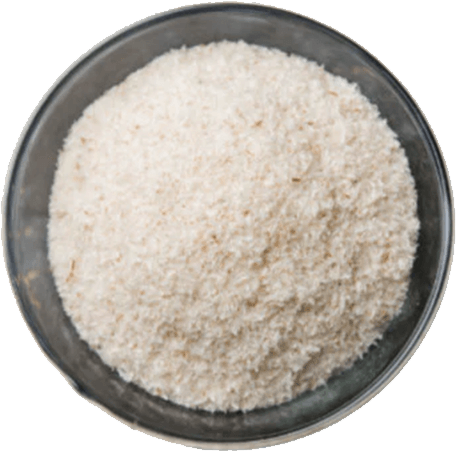
Properties of Psyllium
Psyllium is rich in fiber, the mucilage concentrated in the husk in contact with water increases its weight forming a gel that promotes normal volume and consistency of feces. In addition, it has a prebiotic effect, therefore it selectively promotes the growth and activity of one or more bacteria already present in the intestinal tract.
FAQ
Useful Information
What is Psyllium?
What is Psyllium?
Psyllium is a plant that is increasingly used for its excellent beneficial properties . The term “psyllium” is used to indicate the plant belonging to the Plantaginaceae family and comes mainly from India. The richness of this plant is certainly contained in the covering of its seeds, husk or cuticle. The cuticles, which cover the seed of this plant, are rich in soluble fibers with beneficial properties for the digestive system.
The Psyllium Plant
The Psyllium Plant
Psyllium is a plant that belongs to the Plantaginaceae family, its scientific name is Plantago ovata . Widespread throughout the Mediterranean basin and in the Middle East, especially in India, it is an annual herbaceous plant that prefers semi-sandy soils. Medium-sized, it can reach 50 cm in height and has small and characteristic yellow flowers. For healing purposes, the husks of its seeds are used, rich in emollient and soothing mucilage. The harvest is carried out in March-April when the season is still dry, waiting for the morning dew to disappear.
Benefits of Psyllium
Benefits of Psyllium
It is a food known and used to help the regularity of the intestinal tract . It has an emollient and soothing action on the digestive system, promoting a normal volume and consistency of the stool. Furthermore, it has a prebiotic effect, therefore it selectively promotes the growth and activity of one or more bacteria already present in the intestinal tract.
Taste and texture
Taste and texture
Psyllium husks have a fairly neutral flavor and are light in color. They can be found in various degrees of purity depending on the percentage of foreign bodies present, which can be verified by the color. Usually on the market you can find psyllium husks with a purity of about 95-98%.
NaturaleBio psyllium husks are among the purest (99%). This means that they contain only 1% of foreign material, consisting of harmless substances that are normally found in this type of product. Our Psyllium husks are treated with steam (Steam Treatment) to destroy all bacterial loads, so they can be preserved longer and without risks. Steam treatment is a gentle and safe process, which has only a hygienic value and keeps all the nutritional properties of the food intact.
How to take Psyllium Husks
How to take Psyllium Husks
Organic Psyllium Husks can be consumed in many ways, but must always be consumed with abundant amounts of water. The husks can be in water, drinks, smoothies or juices… or they can be used in bread dough, cakes or as a thickener.
Recipes with Psyllium Husks
Recipes with Psyllium Husks
Psyllium husks can be taken in the following ways:
- water or tea
- drinks or fruit juices
- milk or yogurt
- as an ingredient in homemade desserts
- in bread dough
- in smoothies or fruit juices
- in the preparation of biscuits
- as a thickener
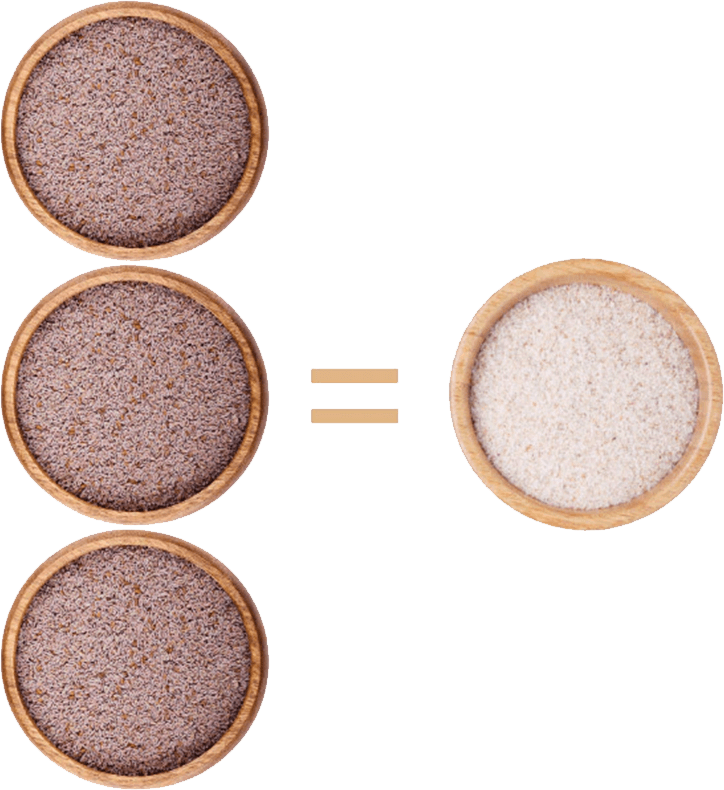
What is the difference between Psyllium husks and seeds?
Both the seeds and the husks, or cuticles, of psyllium seeds can be found commercially. Both are effective, but psyllium seed husks have a greater swelling capacity . As for the quantities, to obtain the same effect you need to consume about three times as many seeds as psyllium husks alone.
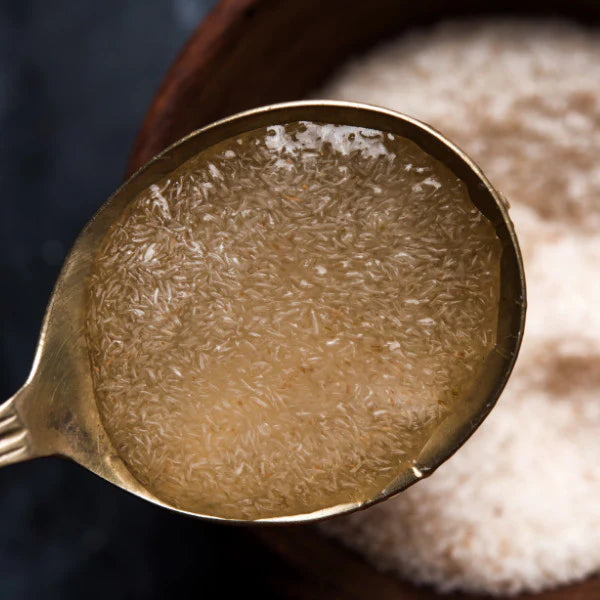
100% Organic
Psyllium husks are pure and 100% organic, they are produced in India in organic plantations and are approved by the Control Body of the Ministry of Agricultural Policies. The best Psyllium comes from organic farming. The richness of this plant is certainly contained in the cuticles that cover the seed of this plant, in fact, which are rich in soluble fibers, with therapeutic properties for the intestinal system . Considered a food used and appreciated throughout the world for its countless beneficial properties.
Recipes with Psyllium Husks
-

Strawberry and Banana Smoothie
Preparation time: ~7 min
This smoothie is ideal for both breakfast and as a snack before training! (for about 4 people)
Ingredients
- 1 banana (large)
- 1 cup strawberries (about 10 frozen or fresh)
- 1/2 pear
- 1 tablespoon of NaturaleBio psyllium husks
- 1l of milk
Preparation
Pour all ingredients into blender and blend until smooth and creamy. Pour into glass and enjoy!
-

Moringa and Chocolate Smoothie
Preparation time: ~7 min
A rich and nutritious smoothie rich in fiber and protein, which will give you energy and vitality throughout the day.
Ingredients
- 1/3 teaspoon Moringa powder NaturaleBio
- 1 and 1/2 tablespoons NaturalBio Cocoa Powder
- 1 cup almond milk
- 2 tablespoons of oats
- 2 frozen bananas and 3 dates
- 1/3 teaspoon psyllium husk
Preparation
Blend all ingredients until smooth and creamy. Serve with your favorite topping…
-

Cherry Chia Pudding
Preparation time: ~20 min
A delicious pudding made with plant-based milk and chia seeds... It can be customized in many variations!
Ingredients
- 500 ml of vegetable milk
- 80 g chia seeds
- 200 g pitted cherries
- 80 ml apple juice (or water)
- 2 tablespoons coconut or brown sugar
- 1 teaspoon of NaturaleBio psyllium husks
Preparation
In a blender, place the pitted cherries, apple juice, sugar (1 tablespoon), psyllium and blend until the mixture is smooth and homogeneous. Transfer to a saucepan, bring to a boil and cook over low heat for 5 minutes. Turn off and let cool completely. Mix the vegetable milk, chia seeds and the remaining sugar and let the mixture rest in the refrigerator overnight. Place a layer of fruit jelly on the base of the glass, add the chia pudding until the glass is full and complete with a spoonful of jelly, 2 cherries and granola.
-

Crackers with Psyllium
Preparation time: ~60 min
Ingredients
- ¼ cup each Sunflower and Pumpkin Seeds and 1 cup ground flaxseed
- ¼ cup sesame seeds
- 2 tablespoons of Psyllium Husks
- ½ teaspoon salt
- 1 tablespoon whole grain mustard
- ¼ cup grated parmesan cheese
- 250ml water (enough to make the mixture firm but soft)
Preparation
Mix all the ingredients together and let it rest for at least 15 minutes. Pour the mixture evenly onto a baking tray lined with baking paper and cover with another sheet of baking paper, distributing the mixture and leveling it to a height of 2-3 mm. Remove the sheet of baking paper from above and cut into small rectangles with a knife (this will make it easier to break them once cooked). Bake at 175° for about 30-40 minutes until they are evenly cooked. Remove from the oven and let cool before filling your crackers!
-

Herb Bread
Preparation time: ~60 min
Ingredients
- 400g of brown rice flour
- 100g chickpea flour
- 2 teaspoons psyllium husks
- ½ cube of brewer's yeast
- 400ml of water
- 1 sprig of rosemary and 4 sage leaves
- salt
Preparation
Soak the psyllium in water and then dissolve the yeast in it. Mix the two flours in a bowl and add the water. Work the mixture well and let it rise in a warm place, covered with a cotton cloth, for 6-7 hours. Knead again adding the salt and chopped herbs, arrange everything in a plum-cake mold lined with baking paper and let it rise again for 1-2 hours, again in a warm place. Bake in a preheated oven at 180-190° for 50 minutes.
-

Dried fruit bread
Preparation time: ~80 min
Ingredients
- 100g almond flour
- 100g of flax seeds and 100g of hemp seeds
- 80g of hazelnuts
- 80g of almonds
- 80g pecan nuts
- 60g sesame seeds
- 375g water 3 tablespoons coconut oil or extra virgin olive oil
- 3 tablespoons psyllium seed husks
- 1 teaspoon salt
Preparation
In a bowl, combine the almond flour, flaxseeds, hemp seeds, hazelnuts, almonds, pecans, sesame seeds, psyllium husk and salt and mix well. Add the water and oil and mix until everything is well distributed. Transfer to a baking sheet previously lined with baking paper and smooth out well using a slightly wet spatula. Let it rest for about 1 hour. Preheat the oven to 180°C and bake for 50 minutes. After this time, remove the bread from the pan using the baking paper and bake for another 20 minutes. Remove from the oven and let it cool completely before cutting into slices.
